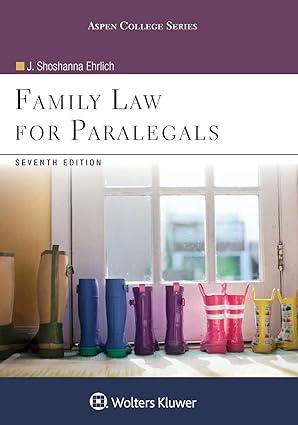This appeal involves a dissolution of marriage action in which the defendant, Bruce L. Bedrick, seeks to
Question:
This appeal involves a dissolution of marriage action in which the defendant, Bruce L. Bedrick, seeks to enforce a postnuptial agreement. Today we are presented for the first time with the issue of whether a postnuptial agreement is valid and enforceable in Connecticut.
The defendant appeals from the trial court's judgment in favor of the plaintiff, Deborah Bedrick. The defendant claims that the trial court improperly relied upon principles of fairness and equity in concluding that the postnuptial agreement was unenforceable and, instead, should have applied only ordinary principles of contract law. We conclude that postnuptial agreements are valid and enforceable and generally must comply with contract principles. We also conclude, however, that the terms of such agreements must be both fair and equitable at the time of execution and not unconscionable at the time of dissolution. Because the terms of the present agreement were unconscionable at the time of dissolution, we affirm the judgment of the trial court. In August 2007, the plaintiff initiated this action, seeking dissolution of the parties' marriage, permanent alimony, an equitable distribution of the parties' real and personal property and other relief. The defendant filed a cross complaint, seeking to enforce a postnuptial agreement that the parties executed on December 10, 1977, and modified by way of handwritten addenda on five subsequent occasions, most recently on May 18, 1989. The agreement provides that in the event of dissolution, neither party will pay alimony. Instead, the plaintiff will receive a cash settlement in an amount to be "reviewed from time to time." The May 18, 1989 addendum to the agreement provides for a cash settlement of \(\$ 75,000\). The agreement further provides that the plaintiff will waive her interests in the defendant's car wash business, and that the plaintiff will not be held liable for the defendant's personal and business loans.....
Questions:
1. Why does the court conclude that postmarital agreements should be enforceable?
2. What does the court say about the difference between postmarital agreements as compared to both premarital and separation agreements?
3. Why does the court ultimately conclude that postmarital agreements require "stricter scrutiny" than premarital agreements?
4. What standard of review does the court adopt?
5. Why does the court conclude that the agreement between the parties is not enforceable?
Step by Step Answer:






